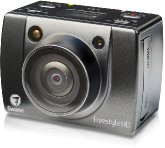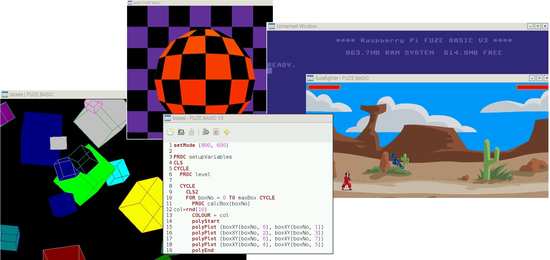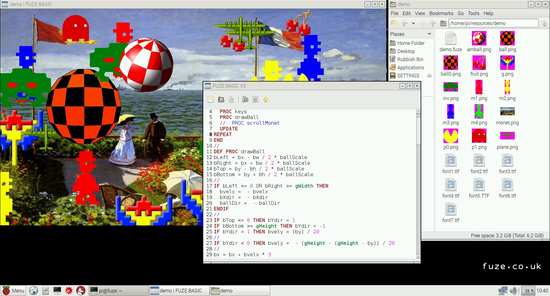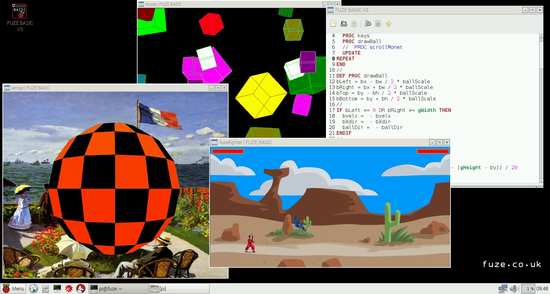Back To BASIC with FUZE
The release of FUZE BASIC V3 for Raspberry Pi for free makes learning to code easier and more accessible than ever
“I'm delighted FUZE are making their implementation free to Raspberry Pi users: it's a fantastic complement to the recently released Raspberry Pi 2, and I can't wait to see what people get up to with it."
Eben Upton, CEO, Raspberry Pi (Trading) Ltd
Since the launch of the Raspberry Pi and the recent addition of programming to the National Curriculum there has been a massive surge in the popularity of the skill – a surge like we’ve not seen for decades. It was in the Eighties, when learning to program was all the rage and the likes of the Acorn, Commodore, Sinclair and Amstrad collectively sold in excess of 10 million units, in the UK alone. In every case the machines ‘booted’ straight to the friendly and accessible programming language called BASIC.
The rest as they say is history… well in this case the rest is actually the here and now, as a great many of those inspired by BASIC are today responsible for the computing systems, websites, applications and general IT we now take for granted.
From Bill Gates and Microsoft, with their first software release being Microsoft BASIC, to the fact every Apple II was shipped with BASIC, one has to ask, where would we be today without it?
“It is where I started a third of a century ago, and I will be forever grateful to the opportunities it created for me.” David Braben, CEO Frontier Developments & co-founder of the Raspberry Pi Foundation
Now, UK based FUZE Technologies Ltd has taken programming back to its roots and announced that FUZE BASIC can now be downloaded for free from www.fuze.co.uk for all Raspberry Pi users.
FUZE BASIC is a highly advanced and modernised version of the BASIC programming language widely accepted as the easiest to learn and teach. Featuring a redesigned user interface and advanced graphic support including sprite and image scaling, angle and alpha controls and rotation, FUZE BASIC is fully configured to run with all models of the Raspberry Pi including the new V2. The whole FUZE system is slick and intuitive, and with FUZE BASIC, more than capable of programming tablet and iOS styled games.
FUZE BASIC provides a more realistic introduction to text based programming than drag and drop environments like Scratch while at the same time, is far more accessible to the beginner than more complex languages like Python, Java and C. For beginners, it’s an ideal introduction to programming – and one that takes a seemingly daunting task back to a simple, fun and easy to learn one.
“BASIC was my first language back in the late 1980s, and I owe my interest in computing to the low barrier to entry and smooth learning curve that it offers.” Eben Upton, CEO, Raspberry Pi (Trading) Ltd
In addition to FUZE BASIC itself being available as a free download, FUZE Technologies also include a 90 page Project Workbook starting with “Hello World” and rising up to Robotic and simple electronic circuit control projects. However, one more thing every home computer back in the eighties came with was a thick, wiro-bound, Programmer’s reference guide. FUZE BASIC is no exception. Again, free-to-download, is the FUZE BASIC Guide, all 160 pages of it. Both the guide and the workbook, and even a preconfigured 8GB SD boot card are all available to buy from the FUZE shop as high quality, and yes.. wiro-bound physical books.
“BASIC is a fantastic, intuitive language with which to learn programming.” David Braben, CEO Frontier Developments & co-founder of the Raspberry Pi Foundation
FUZE BASIC will be available to download from the FUZE website and FUZE Lair from the 28th May.
www.fuze.co.uk
www.lair.fuze.co.uk
About the FUZE
The FUZE was developed by Jon Silvera. Its inspiration came from introducing family members, as young as seven, to BASIC programming on a BBC Micro from the 1980s; playing simple games and writing small programs. “I couldn’t get this out of my thoughts, what if we could make a modern day BASIC Computer in the mould of the BBC / Atari / CBM / Sinclair etc. computers of the 80’s. Would it appeal and could it help to get kids interested in programming again.”
Supporting schools in meeting the requirements of the new National Curriculum for computer programming, the FUZE is a computing platform specifically designed to help make teaching text based programming as easy and as accessible as possible. With a built in electronics workstation, it also provides an exciting and safe platform for students to learn simple electronics.
Back to BASIC – Why?
BASIC (Beginner’s All-purpose Symbolic Instruction Code)
In the late seventies and early eighties The BASIC programming language captured and nurtured millions of ‘bedroom coders’ around the globe. These programmers went on to evolve and develop just about every aspect of the computing industry as we know it today. Of course this is a generalisation but it’s no exaggeration to say that without the BASIC language things would have been very different today. While programming today is far from the simple environments of the eighties the core programming principles remain the same. Variables, Conditional and logical statements, Loops, Memory management, BITs & Bytes, file management and Input/Output are all introduced in FUZE BASIC and are far easier to grasp in its easy-to-understand language and framework. It therefore remains the ideal platform to learn, and for that matter teach, computer programming to all ages and abilities.
About the Raspberry Pi
Raspberry Pi® and the Raspberry Logo are trademarks of the Raspberry Pi Foundation and are used with permission. For more information we recommend visiting the home of the Raspberry Pi at http://www.raspberrypi.org
“I'm delighted FUZE are making their implementation free to Raspberry Pi users: it's a fantastic complement to the recently released Raspberry Pi 2, and I can't wait to see what people get up to with it."
Eben Upton, CEO, Raspberry Pi (Trading) Ltd
Since the launch of the Raspberry Pi and the recent addition of programming to the National Curriculum there has been a massive surge in the popularity of the skill – a surge like we’ve not seen for decades. It was in the Eighties, when learning to program was all the rage and the likes of the Acorn, Commodore, Sinclair and Amstrad collectively sold in excess of 10 million units, in the UK alone. In every case the machines ‘booted’ straight to the friendly and accessible programming language called BASIC.
The rest as they say is history… well in this case the rest is actually the here and now, as a great many of those inspired by BASIC are today responsible for the computing systems, websites, applications and general IT we now take for granted.
From Bill Gates and Microsoft, with their first software release being Microsoft BASIC, to the fact every Apple II was shipped with BASIC, one has to ask, where would we be today without it?
“It is where I started a third of a century ago, and I will be forever grateful to the opportunities it created for me.” David Braben, CEO Frontier Developments & co-founder of the Raspberry Pi Foundation
Now, UK based FUZE Technologies Ltd has taken programming back to its roots and announced that FUZE BASIC can now be downloaded for free from www.fuze.co.uk for all Raspberry Pi users.
FUZE BASIC is a highly advanced and modernised version of the BASIC programming language widely accepted as the easiest to learn and teach. Featuring a redesigned user interface and advanced graphic support including sprite and image scaling, angle and alpha controls and rotation, FUZE BASIC is fully configured to run with all models of the Raspberry Pi including the new V2. The whole FUZE system is slick and intuitive, and with FUZE BASIC, more than capable of programming tablet and iOS styled games.
FUZE BASIC provides a more realistic introduction to text based programming than drag and drop environments like Scratch while at the same time, is far more accessible to the beginner than more complex languages like Python, Java and C. For beginners, it’s an ideal introduction to programming – and one that takes a seemingly daunting task back to a simple, fun and easy to learn one.
“BASIC was my first language back in the late 1980s, and I owe my interest in computing to the low barrier to entry and smooth learning curve that it offers.” Eben Upton, CEO, Raspberry Pi (Trading) Ltd
In addition to FUZE BASIC itself being available as a free download, FUZE Technologies also include a 90 page Project Workbook starting with “Hello World” and rising up to Robotic and simple electronic circuit control projects. However, one more thing every home computer back in the eighties came with was a thick, wiro-bound, Programmer’s reference guide. FUZE BASIC is no exception. Again, free-to-download, is the FUZE BASIC Guide, all 160 pages of it. Both the guide and the workbook, and even a preconfigured 8GB SD boot card are all available to buy from the FUZE shop as high quality, and yes.. wiro-bound physical books.
“BASIC is a fantastic, intuitive language with which to learn programming.” David Braben, CEO Frontier Developments & co-founder of the Raspberry Pi Foundation
FUZE BASIC will be available to download from the FUZE website and FUZE Lair from the 28th May.
www.fuze.co.uk
www.lair.fuze.co.uk
About the FUZE
The FUZE was developed by Jon Silvera. Its inspiration came from introducing family members, as young as seven, to BASIC programming on a BBC Micro from the 1980s; playing simple games and writing small programs. “I couldn’t get this out of my thoughts, what if we could make a modern day BASIC Computer in the mould of the BBC / Atari / CBM / Sinclair etc. computers of the 80’s. Would it appeal and could it help to get kids interested in programming again.”
Supporting schools in meeting the requirements of the new National Curriculum for computer programming, the FUZE is a computing platform specifically designed to help make teaching text based programming as easy and as accessible as possible. With a built in electronics workstation, it also provides an exciting and safe platform for students to learn simple electronics.
Back to BASIC – Why?
BASIC (Beginner’s All-purpose Symbolic Instruction Code)
In the late seventies and early eighties The BASIC programming language captured and nurtured millions of ‘bedroom coders’ around the globe. These programmers went on to evolve and develop just about every aspect of the computing industry as we know it today. Of course this is a generalisation but it’s no exaggeration to say that without the BASIC language things would have been very different today. While programming today is far from the simple environments of the eighties the core programming principles remain the same. Variables, Conditional and logical statements, Loops, Memory management, BITs & Bytes, file management and Input/Output are all introduced in FUZE BASIC and are far easier to grasp in its easy-to-understand language and framework. It therefore remains the ideal platform to learn, and for that matter teach, computer programming to all ages and abilities.
About the Raspberry Pi
Raspberry Pi® and the Raspberry Logo are trademarks of the Raspberry Pi Foundation and are used with permission. For more information we recommend visiting the home of the Raspberry Pi at http://www.raspberrypi.org




































Your Opinions and Comments
Be the first to post a comment!